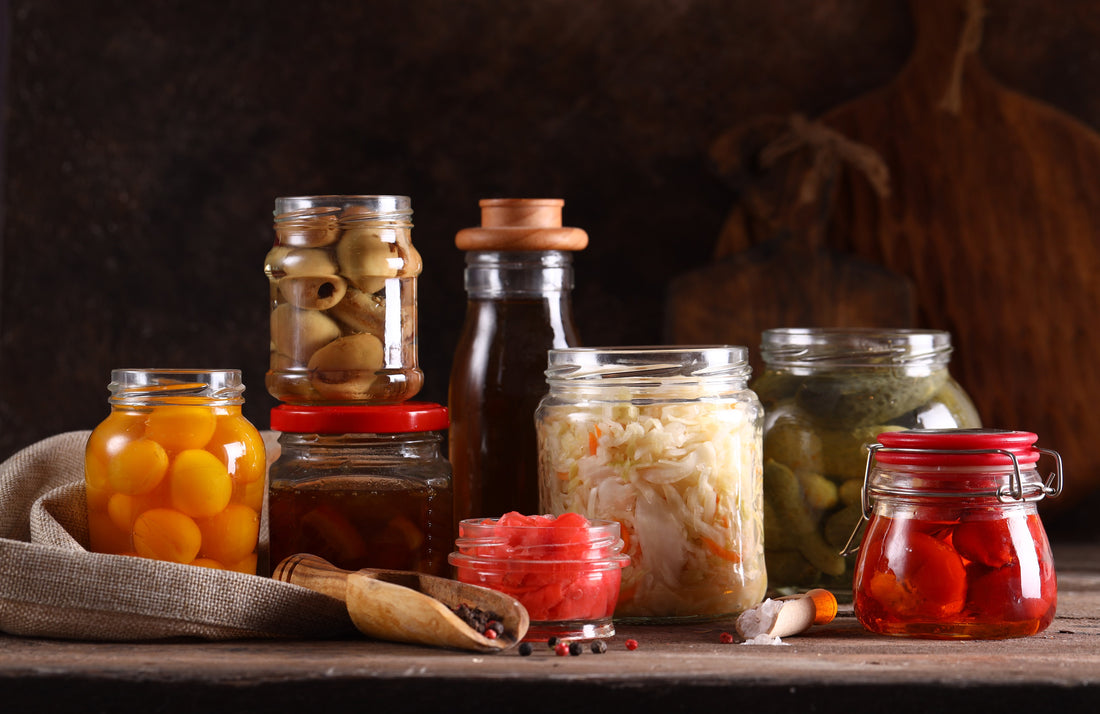
The Fermented Food Revolution
A guide to getting the most out of your fermented food
Here are some popular fermented foods to supplement a healthy diet:
Top 10 Fermented Foods
This very popular fermented drink has grown in popularity over the last century mainly because of its health benefits. Kombucha is consumed for its powerful pre and probiotics that can assist with; weight loss, improving your immunity, fighting minor illnesses, improving skin conditions and it makes a great substitute for soft drinks and alcohol.
Kefir
Kefir can take the form of milk kefir - a creamy, sour fermented dairy drink, or the dairy-free alternative water kefir, which is lactose-free and better still vegan-friendly. Kefir is a high source of protein and it keeps you feeling full so you don't feel hungry. When consuming the recommended daily dosage of kefir, it can actually assist with weight loss.
Yoghurt
Yoghurt contains probiotics in the form of lactic acid bacteria and bifidobacterial. The best yoghurt to consume is the natural kind as not all yoghurts are probiotic, so choose a plain or natural one that contains live/active cultures.
Miso
Containing fermented soybeans, miso is a popular Japanese fermented drink usually consumed as a warm soup. It is rich in antioxidants and the soybeans in miso soup are a great source of protein and even better, a high source of vitamins and minerals. Regular consumption of soybeans can reduce the risk of certain cancers and provide beneficial plant-based nutrients.
Apple Cider Vinegar
For centuries apple cider vinegar has been used to fight a number of illnesses, as well combat minor skin conditions and is even consumed as a weight loss drink. The power behind apple cider vinegar lies in the production of acetic acid during fermentation. It is best to drink apple cider vinegar in moderation as too much acetic acid is not good for the gut.
Olives
The probiotic profile of olives exists in the brine that is used to preserve and cure the olives. It is this salt brine, that essentially creates a microbial environment for the bacteria to work in, and creates a fermentation that enhances the nutrients and vitamins in this natural antioxidant-rich plant source. Fermentation is used in preparing olives to make it more palatable and is a natural preservative so it keeps for longer.
Kimchi
Another popular fermented food, kimchi is traditionally made by fermenting cabbage with a range of spices. The result is a spicy assortment of ingredients that may lower cholesterol and blood sugars for improved metabolic health.
Sauerkraut
Similar to kimchi, this traditional cabbage dish is fermented to release beneficial bacteria such as lactobacilli by pummelling cabbage with salt and then allowing it to ferment in the resulting juices for around 2 weeks. It is not only healthy and nutritious, but it is also highly probiotic and contains the vitamin K2. Eating sauerkraut can help reduce the risk of certain diseases, improve your digestion and even assist with weight loss.
Sourdough Bread
This delicious and nutritious bread is made with a starter culture of yeast and bacteria. Sourdough bread is much healthier than regular baked bread and most importantly, it is more digestible and tastes great.
Tempeh
This Indonesian meat substitute originated in Java and is traditionally made using fermented soybeans. The process involves binding the soybeans into a cake form and adding a fungus called rhizopus oligosporous as a starter culture for Tempeh. Similar to tofu, tempeh is a meat alternate that is popular among vegetarians and vegans.
Whether you are looking to lose weight, improve your health or simply want to eat better, many of us are joining the fermented food revolution as a potential source of nutrient-rich food and drinks that benefit overall health and well-being.
